Vintage Science Fiction month takes place every January, and has a few guidelines:
– read, watch, listen to, or experience something science fiction / fantasy that was created in 1979 or earlier
– talk about it online sometime in January
– have fun
If any of my readers are interested in participating\ use the hashtag #VintageSciFiMonth or tag @VintageSciFi_ or @redhead5318 on Twitter if you’d like your posts to be included in the official retweets and roundups.
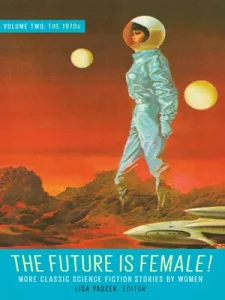 Title: The Future Is Female! Volume Two, the 1970s – More Classic Science Fiction Stories by Women
Title: The Future Is Female! Volume Two, the 1970s – More Classic Science Fiction Stories by Women
Author: Lisa Yaszek (editor)
Publisher: Library of America
Publication Date: 1971 – 1979 for the original publication dates. October 11, 2022 for this specific compilation.
Genres: Science Fiction, LGBTQ, Historical
Length: 548 pages (including author biographies, etc).
Source: I borrowed it from the library.
Rating: 5 Stars
Blurb:
n the 1970s, feminist authors created a new mode of science fiction in defiance of the “baboon patriarchy”—Ursula Le Guin’s words—that had long dominated the genre, imagining futures that are still visionary. In this sequel to her groundbreaking 2018 anthology The Future is Female!: 25 Classic Science Fiction Stories by Women from Pulp Pioneers to Ursula K. Le Guin, SF-expert Lisa Yaszek offers a time machine back to the decade when far-sighted rebels changed science fiction forever with stories that made female community, agency, and sexuality central to the American future.
Here are twenty-three wild, witty, and wonderful classics that dramatize the liberating energies of the 1970s:
- Sonya Dorman, “Bitching It” (1971)
- Kate Wilhelm, “The Funeral” (1972)
- Joanna Russ, “When It Changed” (1972) NEBULA AWARD
- Miriam Allen deFord, “A Way Out”(1973)
- Vonda N. McIntyre, “Of Mist, and Grass, and Sand” (1973) NEBULA
- James Tiptree, Jr., “The Girl Who Was Plugged In” (1973) HUGO AWARD
- Kathleen Sky, “Lament of the Keeku Bird” (1973)
- Ursula K. Le Guin, “The Day Before the Revolution” (1974) NEBULA & LOCUS AWARD
- Eleanor Arnason, “The Warlord of Saturn’s Moons” (1974)
- Kathleen M. Sidney, “The Anthropologist” (1975)
- Marta Randall, “A Scarab in the City of Time” (1975)
- Elinor Busby, “A Time to Kill” (1977)
- Raccoona Sheldon, “The Screwfly Solution” (1977) NEBULA AWARD
- Pamela Sargent, “If Ever I Should Leave You” (1974)
- Joan D. Vinge, “View from a Height” (1978)
- M. Lucie Chin, “The Best Is Yet to Be” (1978)
- Lisa Tuttle, “Wives” (1979)
- Connie Willis, “Daisy, In the Sun” (1979)
Review:
Content warning: Starvation, dehydration, cancer, attempted murder, murder, zombies, and snakes. I will not discus these topics in my review.
There’s nothing like being introduced to so many fantastic science fiction authors at once.
I’ve never been interested in hunting frogs, but I did like the conversational style of Chelsea Quinn Yarbro’s “Frog Pond.” Althea was such a sweet and innocent person that I wondered why she kept disobeying her parents orders to avoid the creek and the mysterious pink and green patches that sometimes appeared in the water there. Surely there had to be something more than frogs to pique her curiosity. There were several wonderful layers to this story that I don’t want to spoil for everyone. What I can say is that the world building was fantastic and Althea was full of surprises for me. I’d love to visit her and her unusual little town again someday.
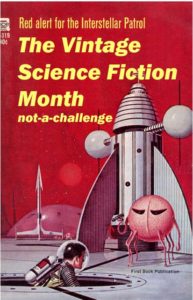 The sudden appearance of old age and impending death in “If Ever I Should Leave You” by Pamela Sargent piqued my curiosity. These things obviously worked different in this world than they do in our own, and it was interesting to slowly figure out what the rules were there. I also appreciated what this tale had to say about aging and grief. There were layers of meaning to it that I slowly unwrapped as I kept reading, although I should leave the details of that for other readers to discover for themselves.
The sudden appearance of old age and impending death in “If Ever I Should Leave You” by Pamela Sargent piqued my curiosity. These things obviously worked different in this world than they do in our own, and it was interesting to slowly figure out what the rules were there. I also appreciated what this tale had to say about aging and grief. There were layers of meaning to it that I slowly unwrapped as I kept reading, although I should leave the details of that for other readers to discover for themselves.
As soon as I realized that the main character of “Hey, Lilith” by Gayle N. Netzer was a middle-aged woman who befriends someone much older than herself, I couldn’t stop reading. So many science fiction books are about teenagers and people in their early 20s that it’s a thrill to see other age groups represented. I appreciated the protagonist’s wry approach to suddenly finding herself in a post-apocalyptic storyline. Honestly, I’d react the same way, and her previous knowledge of how dangerous these settings can be made her refreshingly cautious about her predicament.
This is the second anthology in a series that does not need to be read in order.
The Future Is Female! Volume Two, the 1970s – More Classic Science Fiction Stories by Women was even better than the first volume of The Future Is Female. I’d wholeheartedly recommend it to anyone who loves vintage science fiction.
 Title: Snow
Title: Snow

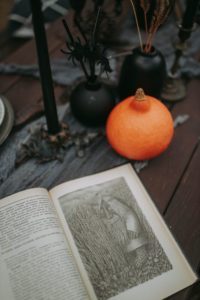 The original theme for this week was “atmospheric books.”
The original theme for this week was “atmospheric books.” Title: The Ghost and the Real Girl
Title: The Ghost and the Real Girl Title: Jathniel, The Immortal
Title: Jathniel, The Immortal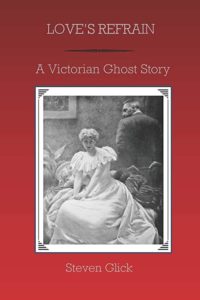 Title: Love’s Refrain – a Victorian Ghost Story
Title: Love’s Refrain – a Victorian Ghost Story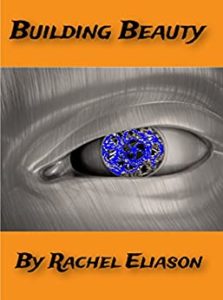 Title: Building Beauty
Title: Building Beauty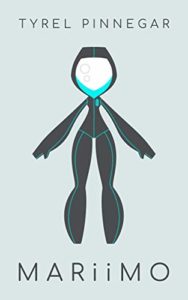 Title:
Title:  Happy Valentine’s Day to everyone celebrating it!
Happy Valentine’s Day to everyone celebrating it!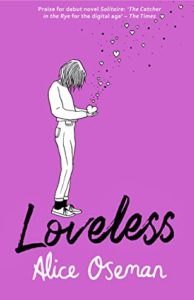
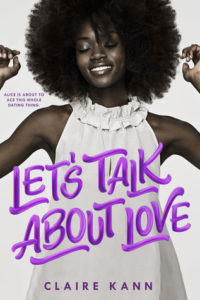
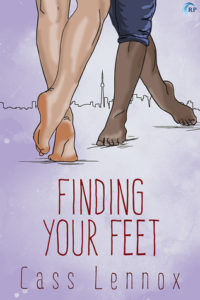
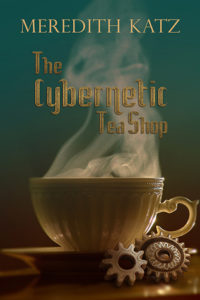
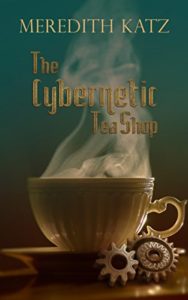 Title: The Cybernetic Tea Shop
Title: The Cybernetic Tea Shop Title: The Future Is Female! Volume Two, the 1970s – More Classic Science Fiction Stories by Women
Title: The Future Is Female! Volume Two, the 1970s – More Classic Science Fiction Stories by Women